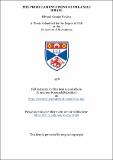The prose lamentations of pre-exile Israel
Thesis
Abstract
After an examination of prayer generally from the history of religions point of view and of lamentation in particular in the ancient Near East, the criteria for the identification of prose lamentations in the Old Testament are determined from recent form-critical work on the cultic Lamentations. The Mosaic prayers are taken as models of speech to Yahweh in ancient Israel. From them three Types of lamentation are identified; Laments, Petitions and Lament-Petitions. The remaining pre-exilic prayers are subject to critical evaluation based on these three main divisions and three minor divisions: personal/individual, national/communal and intercessory lamentations. Wishes, confessions and oracle enquiries are considered lamentations where they conform to the necessary criteria. The main results of the exegesis of the selected 72 lamentations are : (a) The word "lamentation" when applied to prose prayers covers a wide range of Types and sub-Types of speech to God and in itself cannot be understood as literary genre; (b) The Types are mostly modelled on the structural forms of secular speeches made in crisis situations by inferiors to superiors; (c) While moods are shared by all three Types of lamentation, Laments and Petitions are frequently distinguished by different contexts and motifs; (d) The majority of .Laments and Lantent- Petitions exhibit distinctive stylistic or rhetorical characteristics which are shared by a few Petitions only; (e) The charges levelled against Yahweh in a number of prayers indicate the existence of a formal relationship in which Yahweh is expected to fulfil certain specific obligations.
Type
, PhD Doctor of Philosophy
Collections
Items in the St Andrews Research Repository are protected by copyright, with all rights reserved, unless otherwise indicated.

